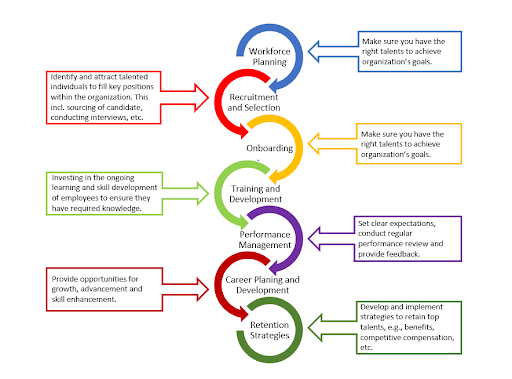
Posted on: Feb 06, 2024
Ever wondered how companies deal with getting the right employees on board and keeping them happy? Well, that’s where talent management comes into play. In this article, I am going to break down the essence of talent management. As you can imagine it’s not all challenges – there are some great benefits too!
What is Talent management?
Talent management is a strategic and organized approach to attracting, recruiting, developing, and retaining the most talented employees in the long term. It also includes development opportunities and strategies that motivate individuals and teams to perform at their best.
What does Talent management include?
Talent management typically includes the following key components:

Talent management culture within an organization refers to a strategic approach that focuses on attracting, developing, and retaining skilled and high-potential employees. Such a culture offers numerous benefits to the organization, contributing to its overall success and sustainability.
Here are some key advantages:
Attraction and Retention of Top Talents
- A talent management culture helps in attracting talented candidates who are drawn to organizations that invest in and value their employees.
- It aids in retaining high-performing individuals by providing opportunities for career growth and development.
Enhanced Employee Engagement
- Talent management practices promote employee engagement by aligning individual goals with organizational objectives.
- Employees feel valued when they see a commitment to their professional growth and well-being.
Increased Productivity and Performance
- Investing n talent development leads to a more skilled and capable workforce, which, in turn, boosts overall organizational productivity and performance.
- Well managed talents are more likely to contribute their best efforts ad expertise to the company’s goals.
Succession Planning and Leadership Development
- A talent management culture includes succession planning, ensuring a pipeline of capable leaders for key roles within the organization.
- Leadership development programs help identify and groom individuals with leadership potential, fostering long-term organizational stability.
Innovation and Creativity
- Talented individuals are more likely to contribute new ideas ad creative solutions to challenges, fostering an environment of continues improvement.
Cost Savings
- Retaining and developing existing talent can be more cost-effective than recruiting ad onboarding new employees.
- Reducing turnover and ensuring employees are equipped with the necessary skills can save the organization resources in the long run.
Competitive Advantage
- Organizations with a strong talent management culture gain a competitive edge in the marketplace.
- A highly skilled and engaged workforce is a valuable asset that can set a company apart from its competitors.
At first glance, it seems that implementing Talent management culture brings only benefits, but it must be remembered that before an organization decides to implement this process, it must also look at the challenges it may bring, and a few of them are mentioned below:
- The implementation of talent management program could be expensive in terms of time, resources and financial costs.
- Talent management culture requires to have the engagement of business process owners who have the authority to break down organizational silos, what might be challenging.
- Talented individuals won’t tolerate a boring job for very long, if at all.
- Highly talented employees require higher salaries, which must be impressive, as they usually believe they are worth it.
In summary, a Talent Management culture is integral to building a dynamic, resilient and high-performing organization that can attract, develop and retain the best talent in the competitive landscape.
Author:

Izabela Henke
Senior Project Manager & Senior Consultant
